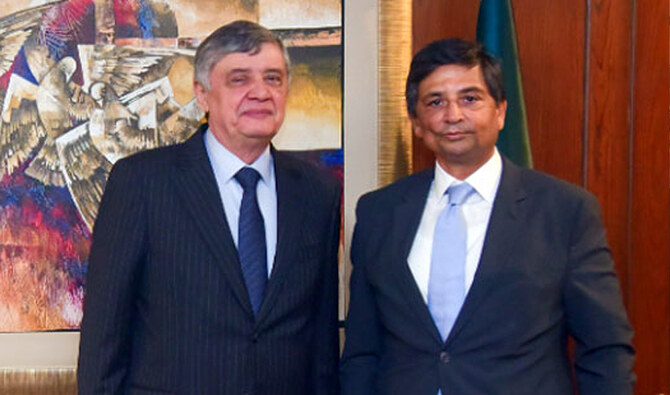ISLAMABAD: Interior Minister Mohsin Naqvi held a meeting on Saturday to review security measures for foreigners in Pakistan, particularly Chinese workers who have been the target of several recent militant attacks.
The killing of five Chinese nationals in a suicide bombing on their convoy in northwest Pakistan on March 26 has put the spotlight on the security of Chinese workers, many of whom work on road, infrastructure and development projects under the China-Pakistan Economic Corridor, a flagship of the Belt and Road scheme.
During a visit to Islamabad on Friday, Liu Jianchao, a prominent Chinese minister, said Pakistan’s security challenges were undermining investor confidence. The following day, Saturday, the Pakistani interior minister chaired a meeting to review the “overall security situation in the country.”
“The meeting reviewed the measures taken to protect foreigners, especially Chinese citizens,” the interior ministry said in a statement. “Naqvi directed strict adherence to the SOPs of the security plan … emphasized that the formulated plan should be regularly monitored at every level.”
The minister called on relevant security and intelligence agencies to keep “close coordination to thwart the nefarious designs of anti-national elements.”
“There is no room for negligence in the implementation of the security plan,” the statement quoted Naqvi as saying.
Addressing the 3rd Meeting of the Pakistan-China Joint Consultative Mechanism (JCM) in Islamabad on Friday, Liu said security threats were the “main hazards” to CPEC cooperation.
“As people often say, confidence is more precious than gold. In the case of Pakistan, the primary factor shaking the confidence of Chinese investors is the security situation,” the official said in rare public comments by Beijing on Pakistan’s security challenges. “Without security, the business environment cannot really improve.”
The March 26 attack on the Chinese convoy en route to a hydropower project in Dasu was the third major one in a little over a week on China’s interests in Pakistan, where Beijing has pledged over $65 billion in energy, infrastructure and other projects as part of its wider Belt and Road initiative.
The Mar. 26 bombing followed a Mar. 20 attack on a strategic port used by China in the southwestern province of Balochistan, where Beijing has poured billions of dollars into infrastructure projects, including the deep-sea port of Gwadar, and a Mar. 25 assault on a naval air base, also in the southwest. Both attacks were claimed by the Baloch Liberation Army (BLA), the most prominent of several separatist groups in Balochistan.
Dasu, the site of a major dam, has been attacked in the past, with a bus blast in 2021 killing 13 people, nine Chinese among them, although no group claimed responsibility, like the Mar. 26 bombing.
Pakistan is home to twin insurgencies, one mounted by religiously-motivated militants and the other by ethnic separatists who seek secession, blaming the government’s inequitable division of natural resources in southwestern Balochistan province.
Chinese interests are mostly under attack primarily by ethnic militants seeking to push Beijing out of mineral-rich Balochistan.


















